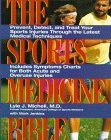Muscle Cramp
Too much exercise and a loss of electrolytes (e.g. magnesium) can cause a muscle cramp. Sudden pain, inability to move and hardening of the muscle are signs of a muscle cramp. A muscle cramp is an intense, long contraction of the musculature. It can happen during as well as after physical strain. Muscle cramps are caused by a local metabolic disorder of the muscle. Inadequate blood supply affects the metabolism of the muscle. As a result the muscles are unable to contract and relax properly. A protective mechanism causes the muscle fibres to contract strongly if they are overstrained. However, during this strong contraction the blood vessels in the muscles are pushed together which further affects blood circulation. It becomes a vicious circle of muscle tension and a gradual decrease in blood circulation which ultimately leads to a muscle cramp.
Symptoms
- Sudden pain
- Inability to move
- Hardening of the affected muscle
top 

The Athlete's Book of Home Remedies: 1,001 Doctor-Approved Health Fixes and Injury-Prevention Secrets for a Leaner, Fitter, More Athletic Body!, Jordan Metzl, Mike Zimmerman |
Treatment Stretch the affected muscle intensely for 10 to 20 seconds in the opposite direction of the cramp.This causes a reflex to develop which leads to an automatic relaxation of the cramped muscle. Thereafter do flexibility exercises, apply heat to the muscle and gently massage it.
Prevention
- Warm up properly
- Stretch
- Sufficient intake of liquid and electrolytes (e.g. magnesium and calcium) by drinking mineral water
- A well-balanced diet.
Is it necessary to go to the doctor because of a muscle cramp?
You should consult the doctor if the muscle cramps occur repeatedly without any obvious reason or if you feel that the muscle cramps are caused by the intake of medication.
top 

Sports Medicine Bible : Prevent, Detect, and Treat Your Sports Injuries Through the Latest Medical Techniques
|

